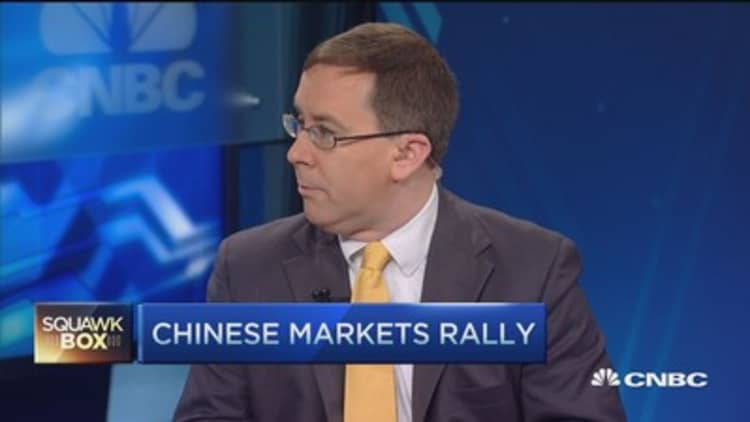
There's a "total disconnect" between this year's strength in Shanghai stocks and the slowing Chinese economy, strategist Patrick Chovanec said Wednesday.
The main stock gauge in China, the Shanghai composite, closed Wednesday at a seven-year high, up 30.82 points, or 0.63 percent, to 4,941.71. The index has risen 142 percent this year.
Read MoreShanghai Comp, Nikkei outperform lackluster Asia
"It's clearly in bubble territory and this a replay of what happened in 2007, where the Shanghai index more than doubled, actually tripled, and then came down just as abruptly the next year," Chovanec, managing director and chief strategist at Silvercrest Asset Management, said on CNBC's "Squawk Box."
"It may go up further," he conceded, but argued that "it's being driven by momentum and this idea that somehow stimulus is going to save the day."
Chovanec said that won't happen.
"China has had easing since 2008. If you look, China's [quantitative easing] over the past several years has been the largest in the world," he said. "They played that card. They played it over and over again."
Chinese Premier Li Keqiang said earlier this month the world's second-largest economy has room to maneuver its policy and boost growth because officials have avoided using strong, short-term stimulus in recent years.
At a news conference following China's annual session of parliament, Li addressed the government's plans to deliver economic growth of around 7 percent this year. "Achieving this target will not be easy."
If China's growth rate were to come in at 7 percent in 2015, it would be the slowest expansion in a quarter century.
Along with the overall economy, China's real estate market has also been cooling. And Chovanec said that might explain why Shanghai stocks have been surging in 2015.
"You've got Chinese investors who have always been pouring their cash into the property market [who] are now disengaged from the property market because it's been down for over a year," he said. "They need somewhere else to put their cash."
Prior to joining Silvercrest, Chovanec taught at Tsinghua University's School of Economics in Beijing. He had also worked at a series of private equity funds focused on emerging markets.
He teaches part time as an adjunct professor at Columbia University's School of International and Public Affairs.
—Reuters contributed to this report.


